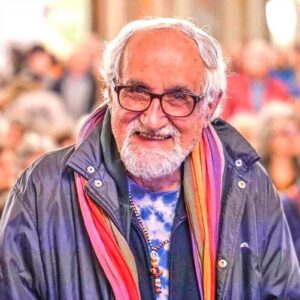by Ambra Visentin

The world’s population is impoverishing at an unprecedented rate, while wealth remains in the hands of a very small elite. The latest Oxfam report predicts that at this rate we will have the first trillionaire in history within the next ten years. We discuss this phenomenon with Father Alex Zanotelli, a member of the Combonian Missionaries of Verona. He lived first in Sudan, then in the slums of Nairobi, and returned to Italy a decade ago to live in the Sanità district of Naples, from where he is a leader in the civil struggle. He is the author of numerous books and the founder of Italian movements dedicated to social harmony and equality.
What was your impression of the Oxfam report?
“Devastating. The gap that leaves you speechless is perfectly captured by what they use as the opening symbol in the report: the five biggest billionaire in the world have doubled their wealth, while 5 billion people have become poorer. We are looking at a system that allows 10% of the world’s 8 billion people to consume 89% of the goods produced on this planet. This imbalance has been going on for some time, but it is now accelerating dangerously.”
The world is in the hands of big business, but Governments, which are supposed to represent the interests of the people, seem to be doing nothing about it. Why is this?
“Our so-called Western democracies are all in crisis. Just look at what is happening in the United States. Our Governments are prisoners of the financial economic system, first of all the banks and then the big multinationals. The inability of Governments to decide on vital issues is becoming more and more obvious. We have seen the failure of COP28, the result of which is that we will have to wait until 2050 before anything changes, even though we are heading full speed towards ecological disaster and a scorching summer.”
How did we come to this transfer of power? Did we lack more courageous Governments?
“It has been a slow journey and it has happened almost without us noticing. The tragedy is that today we are free to vote for whomever we like, but once in power the political representatives have their hands tied. We need to think about this and find a way to change it. Otherwise, neither nuclear war nor environmental disaster can be avoided.”
How can real change be achieved?
“We have to start from the bottom. I’m a missionary, a priest, but I’m also very critical of my Church. We have a Pope who is really more of a prophet and who has shown us the way, but the message has not got through, I find enormous resistance from everyone. We need to raise people’s awareness, to help them take a critical look at reality. But there is a big problem here. The wonderful media that have been invented lead to a general psychic stupor. In the book ‘Surveillance Capitalism’ by Shoshana Zuboff, the question is posed very clearly: if industrial capitalism has done so much damage to nature, how much damage can surveillance capitalism do to human nature? Information, even our journalism, is deeply tied to this system, so there is only one narrative about things. This prevents real awareness. It can be countered by small realities: groups or communities that form what Pope Francis calls great popular movements capable of shaking up these systems of Government.”
We know that some of the multi-billionaires mentioned in the report are new media ‘gurus’. What is their impact on the world?
“Not only do they control information, but they often contribute directly to the economic divide, to inequality in the world. They employ workers in developing Countries by exploiting and underpaying them. And the issue of new communication is also complicated in perspective. If the world is ‘destined’ to be networked, we will soon not be able to afford the energy needed to keep the system going.”
Poverty also means migration. How have Italian governments dealt with this over time?
“Almost all governments, left or right, have pursued racist and exclusionary policies towards immigrants. Starting with Turco-Napolitano, through Bossi-Fini, Minniti and then Salvini. It is a mentality for which migration is seen as a threat, not as an important opportunity. There is a fear of the other, whether Muslim or coloured in general. But we are at a crossroads: either the world will become a pluralistic humanity, or we are destined to tear each other apart.”
Italy is at the bottom of the European ranking in terms of income distribution. How can this be reversed?
“The purpose of the state must be to distribute so that everyone can have a life worth living. In practice, we need a courageous government that is able to obey the constitution. I now see everywhere the enormous suffering of those who can no longer cope economically. Growing tensions can lead to riots and protests, as we have seen in Germany, with farmers protesting against runaway inflation.”
The European elections are coming up. Are there any political figures who could bring about change?
“White supremacism is on the rise in Europe. There is a rejection of the other. And that is what the far right is based on, what it is based on and what it is winning on. We in the West have this problem. We are convinced that we have the civilisation, the culture, the religion that gave us the ‘legal’ or theoretical basis to colonise the world for 500 years. I fear that Europe is going to get worse and worse and that we need a cultural revolution in which religions and churches will have to play a major educational role that they have not yet taken on.”
On the cover photo, view of Mumbai skyline with skyscrapers over slums in Bandra suburb ©Dmitry Rukhlenko/Shutterstock.com
























